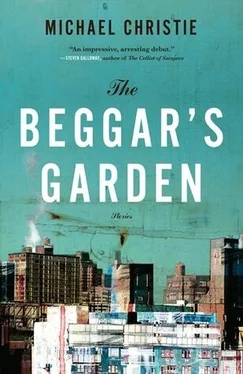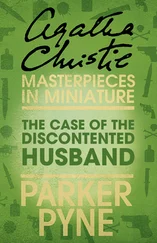“Here you go, Andrew,” Luis said, sliding a cup across the counter.
“These pills have eyes of the tiger shark,” Drew said. His cup brimmed with pills, a little buffet of shapes and colours. It took four swallows to get them all down and Luis had to refill his water twice. Saul pondered the pharmacological rodeo taking place in Drew’s gut: Zyprexa, Carbamazepine, Clozapine, Seroquel, Effexor, all of which he himself had been given at one time or another, their names like alien cities, pregnant with syllables as unusual as the minds they were invented to reconfigure. Saul knew Drew was too far afield for a return journey, but as Drew tottered off for the smoke he received only after he took his pills, Saul pitied him for an instant. How horrible they couldn’t fit it all into one capsule.
“You did a great job mopping, Saul. I’d eat off that floor, no kidding,” the Assassin said, grinning as he pushed a cup of pills, one blue (what Kraepevic bluntly called an antipsychotic) and one orange (to inhibit the side effects of the other) toward him.
“Has the mail arrived yet?” Saul said, attempting to drain any eagerness from his voice. He should be hearing any day from Martin Shenck.
“No, sorry — I mean, yes. It came, but there was nothing for you — Oh, wait …” he said, reaching below the counter. He plunked one more large, urine-tinged pill into the cup. “I forgot to put this in, a multivitamin. Dr. Kraepevic ordered it, said you were looking a little pale.”
Who knew what was fear and what was excitement in the sensation that gripped Saul at that moment. How silly it was to think the Assassin would risk hand-to-hand combat in the laundry room. This was no amateur; he was sophisticated, clandestine. Saul had often thought the perfect murder would be to poison someone slowly. A crime without a witness. Because watching the victim die was like attempting to see the hour hand move; people simply lacked that kind of attention span. This new yellow pill was no doubt laced with something vile and unnameable, and probably invisible to lab analysis. Even if Martin Shenck and his investigators arrived in time, they’d test the pill, find nothing and side with the Assassin and his extensive credentials spoken of so highly by Kraepevic in his office.
“Who signs your paycheque, Assassin?” Saul said, grasping the cup of pills in one hand, water in the other.
“Same as everyone else, Saul, the Ministry of Health,” he said, crinkling the dark pelts of his eyebrows.
“And it’s good money? I mean for what you do to people? It’s worth it?”
“Hurry the fuck up,” said a voice from somewhere in the line. “I like this job,” said the Assassin.
Saul tipped the dose of pills into his mouth, the new pill large and bitter on his tongue. He splashed them with water, swallowed.
The Assassin leaned toward him, his hefty forearms on the counter. “Saul, the doc said you were having some trouble adjusting to some of the newer staff, so I just wanted to let you know, if there’s anything I can do to make things go easier for you — you know, adjustment-wise — just talk to me any time. Sound good?”
Saul nodded. He’d already manoeuvred the three pills under his tongue, a technique he’d mastered during that whole debacle with the sexually inappropriate nurse Janet, when he’d needed his mind unmuddled to successfully parry her advances.
“Okay, Saul?” Luis said again, his eyes wide with feigned empathy.
“Yup. Ochay,” Saul said.
“Great,” the Assassin said, visibly relieved.
Saul was relieved as well. Although fear was twisting his stomach like a balloon animal, it thrilled him to have detected such a diabolical plot. And at least he could spend the final days of his pitiful life clear-headed enough to muster some resistance, however futile it might be.
Saul took the empty water cup and plopped it into the other one that had held his pills, pushing the little stack of paper cups back to Luis.
“King me,” he said, and walked casually to the washroom, where he spat the already melting and bitter slurry into the toilet.
Other than twenty-four-hour news, Saul’s favourite TV program was the detective show Columbo. This dishevelled, lazy-eyed dwarf, who acted the imbecile in order to lull criminals into a false sense of security only to spring his trap on them at precisely the most opportune moment, owned acres of Saul’s heart. In today’s episode was a blond woman whose father was murdered with a seven iron. This woman spoke words that Saul could not help but find personally relevant. “Sal, can’t we just let the detective do his job?” And then, “Sal, we have to move on with our lives, my father wouldn’t want us to act like this.” Saul could tell that her words held something prophetic inside them, but to what purpose he couldn’t decode.
It had been three weeks since he’d commenced medicating the sewer system and his brain was crackling with sharpness as the chemical fog burned off him. This morning, upon waking, he’d felt a sensation like a subtle tearing away behind his eyes, then sensed a spotlight flicking on, its beam falling somewhere at the base of his skull. Today he’d completed the Spanish castle puzzle, plowed through a crossword, and his normally forgotten childhood was returning to him in vivid, painful chunks.
“Do you think I need to move on?” he asked Tina as Columbo ‘s credits scrolled at an unreadable pace.
“Move on where?” she said.
Tina was a Voluntary, meaning she chose to be there. The story was, her parents brought her the day of her eighteenth birthday and made her promise to always sign the voluntary admission forms each year when they expired. People said they toured the continent relentlessly with one of the largest RVs allowable on the road.
Saul got up and flipped to the twenty-four-hour news station — no remote, because Georgina had dunked it in sugar-free Kool-Aid — to see what skirmishes men like the Assassin were concocting in the world’s hot spots. Some hungry-looking boys had firebombed an armoured vehicle, incinerating a diplomat; vengeful machete-wielding militants had seized a town, killing all but those they wished to rape. As if the images weren’t enough, words traversed the bottom of the screen like a freight train loaded with sadness. “What the people of this country need right now, Chris, is leadership,” a reporter said, and Saul found that he couldn’t agree more.
“But from where?” Saul said, possibly out loud.
“I hate news. Let’s watch my movie,” Tina said, the worn VHS tape clutched in her hands, still purple with lunch’s dessert gelatin. The tape had been re-dubbed at least ten times, thus accumulating a permanent drizzle of static. Tina would pass every minute of her life viewing it if she could. To her, its joys were boundless. Staff would limit her viewings if she hoarded porridge in her room or cackled at something inappropriate, like the dropping of a plastic cup.
Saul sat watching Tina watch her movie while she picked obliviously between her legs with a long thumbnail. Back when there was funding, a volunteer group took Tina and some other patients — Saul was in the Quiet Room at the time — to ride on a miniature train that looped around a great treed park. The staff member who’d brought the video camera had no idea he was shooting a movie that would be viewed more times than Jaws, except by one person many times rather than by many people just once. In the movie, Tina rode up front of the train with the handsome conductor. The train pulled into the station to a recorded whistle sound, Tina clapping giddily as she hung from his arm, her sweatpants yanked up high near her armpits and a yellow sun visor pulled down uncomfortably over her hair like someone else had put it on her.
Читать дальше












